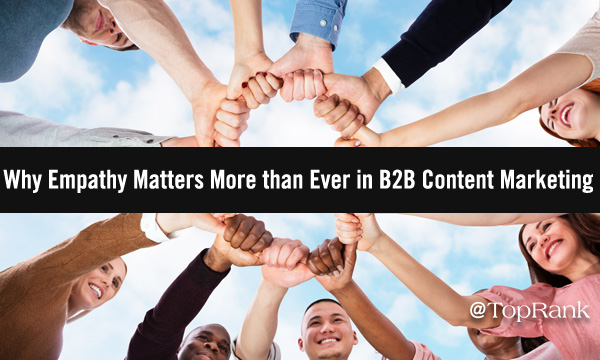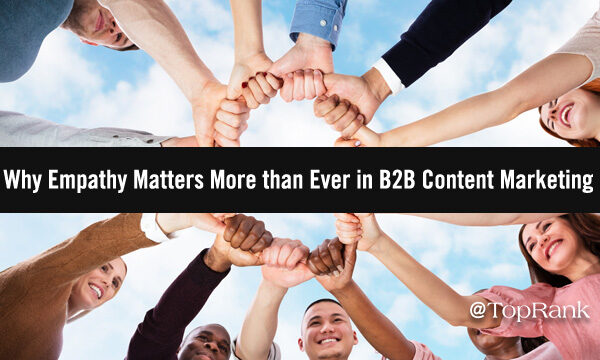
B2B marketers, ready for some TRUTH BOMBS?
Here we go: We need to make our content more human and more empathetic. B2B content doesn’t have to be boring; in fact, it can’t be boring and be effective. B2B buyers are just people — we need to talk to them like people.
Are you blown away by the depth and breadth of my insight? Ready to book me at your next marketing conference?
Okay, all sarcasm aside: We all have heard the old “B2Me” speech a dozen times. I’m not here to give it to you again.
Instead, I want to get deeper into the specifics of what it means to be empathetic and provide value with content.
I say this because, despite the hours of keynote speeches on the topic, B2B marketers are still coming up short. In a recent poll, 79% of buyers surveyed said they were served irrelevant content.
Your buyers need to make informed decisions and they crave intelligent direction. But a lot of them aren’t getting it.
Why Empathetic Content Matters Now More than Ever
Most B2B buyers are feeling the crunch right now. They’re looking to bounce back from the pandemic — many with newly-structured workforces and processes. They need to create momentum, establish a productive new normal, and roll with the changes that have been forced on every business.
And for most, they need to do all of the above within tight budgetary constraints and increased executive oversight.
In short, the pressure’s on to make the right decisions and champion change. Stagnating isn’t an option.
To cope with these issues, B2B buyers rely on content that is trustworthy, helpful and informative. The brand that can become a trusted advisor is far more likely to win the business.
But when it comes to relevant, empathetic content, we’re talking about more than stat sheets, white papers or case studies.
Three Key Elements of Successful Content
It can seem like marketing’s goals for content and buyers’ goals for reading it are at cross purposes. Marketers are trying to prompt action; buyers are trying to get information. In reality, though, the two goals go together fine. Informative content can provoke action, if it’s done right.
Truly valuable content should be:
- 1 — Helpful. First and foremost. But it’s important to define what “helpful” means. Helping means giving the reader information that can help them improve their working life. What information can you give that will make your reader better at their job? Or help them impress their boss, get promoted, or round out their skill set? A recent dispatch from Google put it this way: “People report that helpfulness is their top expectation of brands since the start of the COVID-19 pandemic, with 78% saying a brand’s advertising should show how it can be helpful in everyday life.”
- 2 — Audience-Focused. Too often, marketing content starts with a brand’s product or service, and reverse-engineers it to fit the audience’s pain points. “Our product does X, therefore we need to prove that audiences need X, create that demand and then CTA to a demo.” But truly empathetic content is the other way around. It’s not centered on just the problem set that your solution can solve — it’s looking at the audience holistically.
- 3 — Purposeful. Consumers are growing more concerned with making sure brands’ values match their own, and the same is true for B2B buyers. Truly empathetic content helps the audience see their ideals reflected in your brand. A genuine expression of your brands’ values can help define who your customers are and start establishing a relationship.
How to Improve your Content’s Empathy Quotient
So how do you make sure your content is helpful, focused on the audience, and purposeful? It doesn’t happen by accident. Here’s how our agency makes sure that our content passes the test.
- 1 — Keyword Research. People used to think of keyword research as a way to see how to convince search algorithms that their content was worthwhile. Now we know better: Keywords are an indicator of buyer intent. They tell us what people are searching for, what they need, and how they put that need into words. Keyword research is more than an “SEO play.” It’s foundational for creating helpful content.
- 2 — Content Architecture. Your brand should have content available for each stage of the buyer’s journey, from awareness to action to advocacy. The best way to make sure you have all the stages covered is to include it in your content planning. Aim for a mix that balances the top, mid and bottom of the funnel, with plenty of content to cover each.
- 3 — Organizational Data. Marketers should be using their internal customer data to guide content creation, but shouldn’t stop there. Your sales department have invaluable data about frequently asked questions, buyer behavior, demographics and more. Customer service can tell you what features customers value, what they need help with, and so on. Bringing in data from other departments will help you see the buyer as a whole person, not just a marketing audience.
- 4 — Influencer Contributions. Buyers want to see themselves and their ideals reflected in your content. When you co-create with influencers that your buyers already follow and trust, it’s easier to show how your brand is the right fit. In addition to the other plentiful benefits of influencer marketing, the way it helps establish credibility is a key component.
Don’t Be Content with Unempathetic Content
B2B marketers have heard for years about how content needs to be engaging, entertaining, informative, and never boring. At the heart of all of these considerations, however, is that content needs to put the audience first. It needs to be based on a deep understanding of what your potential customers need and desire, and it must demonstrate your brand’s values and how they align with your audience.
In our neverending quest for more awesome content, empathy should be our guiding light and driving force.
Need help with your content? We’re here for you.



